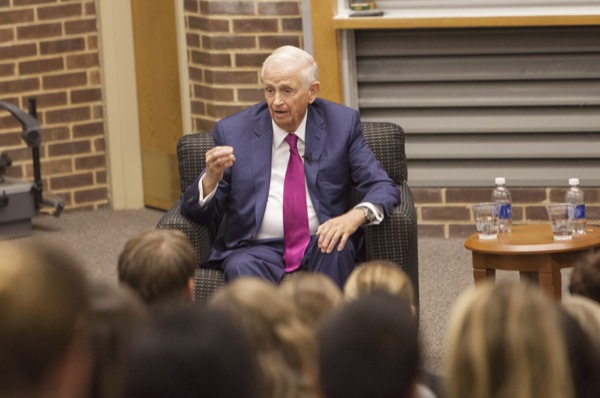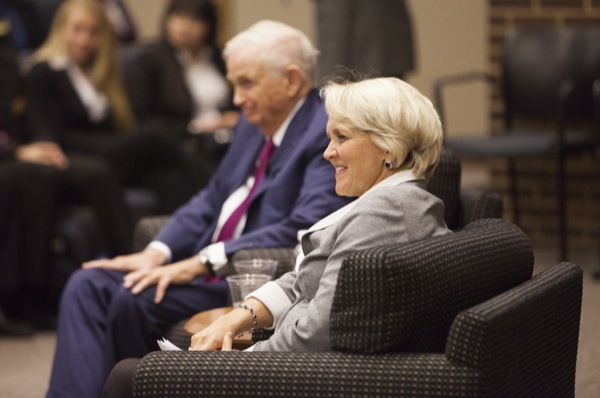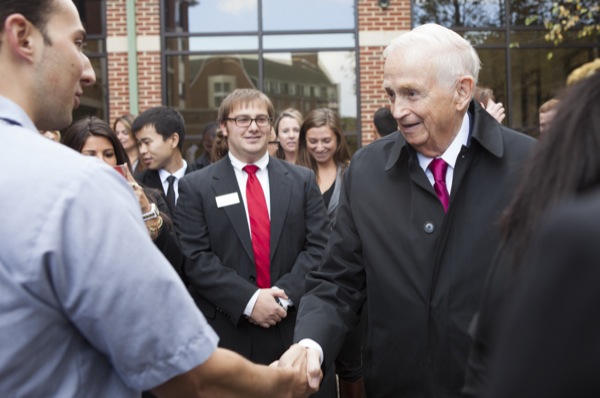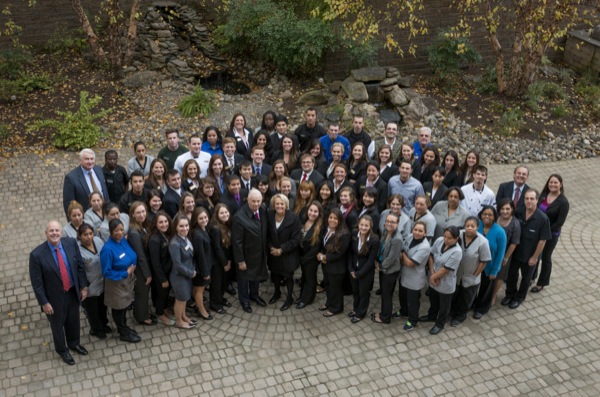


Marriott memories
Global lodging executive shares stories of company success
10:32 a.m., Oct. 28, 2013--It may take reality television shows like CBS’ Undercover Boss for some executives to get a glimpse at what employees throughout their company ranks do on a daily basis, but for J.W. (Bill) Marriott Jr., being a part of his employees’ daily work lives is simply good business.
“I once toured a competitor’s new hotel overseas and when we decided to have lunch at the employee cafeteria, it took the manager 15 minutes to try to find it because he had never been there,” said Marriott. “But I can go to our New York Marriott Marquis and have lunch with the general manager and associates and see the manager connect with each of the employees. That’s the difference you’ll see with a manager who really cares about his people and it’s one of the keys to the culture of our business.”
People Stories
'Resilience Engineering'
Reviresco June run
In fact, according to Marriott, back in the 1930s the company hired a doctor and later in the 1940s hired a surgeon. “Of course that was before the regulations there are nowadays but it is evidence that from the start we’ve believed in taking care of our people,” he said.
Marriott, with daughter Debbie Marriott Harrison, who has held several positions with Marriott since 1975, were on the University of Delaware campus Thursday, Oct. 24, as part of the 2013-14 Chaplin Tyler Executive Leadership Series.
According to Harrison, it’s that principle of taking good care of people and customers that separates the global lodging company from its competitors.
The other principles, which Marriott tag-teamed with Harrison to recount, include pursuing excellence, acting with integrity, embracing change and serving the world. More on each of the guideposts appears in Marriott’s recent book, Without Reservations.
Marriott said he always took his career one step at a time and focused on the present task at hand, from graduating college to completing his service in the U.S. Navy to earning a place in the family business. As for the family business, that all began when he took a kitchen job in the family’s Hot Shoppes restaurant chain and faced the task of cleaning out the deep fat fryer.
After working in the kitchen for four years and learning all the jobs that entailed, he joined the company full time in 1956 and took over management of Marriott’s first hotel shortly thereafter.
He became executive vice president of the company and then its president in 1964; he was elected CEO in 1972 and chairman in 1985.
But throughout the interview-style presentation, Harrison and Marriott often returned to the company focus on people.
Marriot recalled Dec. 21, 1954, when President Dwight D. Eisenhower had occasion to visit his family’s farm.
“We were supposed to go quail shooting but it was a cold day,” recalled Marriott. “And Ike said, ‘What do you think – should we shoot quail or sit by the fire?’ It was those magic words – ‘what do you think’ – that are so important. I learned that getting the input of people makes a good executive and if you don’t, you’ll find yourself out front with nobody outside wanting to come in.”
As for the number one quality Marriott looked for in the people his company puts first? Smiles.
“I want people who are always smiling,” said Marriott. “That is part of our core culture and reflects people who are taken care of. They know we’re concerned, they know we have a career path for them. I always say it’s best to hire friendly and train smart. You can train an intelligible person but you need to have someone friendly if you want them to engage with people.”
And that positivity shows. Marriott International has over 3,800 properties in 72 countries and territories and has consistently been named to Fortune’s lists of most admired companies, best places to work and top companies for minorities.
Yet despite the company’s many successes and positive people culture, Harrison pointed out that her father also taught her that it is OK to fail once in a while and to make tough decisions. She asked her father to recall the start of the Marriott Marquis in Times Square.
Marriott pointed out that the location back in 1982 was not quite the same tourist attraction that it is today; on a site visit, he and colleagues witnessed some less than desirable business just a block away from the proposed location.
“We were determined to build the Marquis hotel in New York, though” said Marriott. “I had to make a decision by midnight to spend millions of dollars, I had the mayor’s office calling me, my dad telling me that each room had to have balconies with AstroTurf. It was a big risk but I had to make the decision, so we went ahead and it cost twice as much to build as we expected, but today it’s the most profitable hotel in our business.”
Difficult decisions today involve thinking about a global strategy for the company.
“It’s an interesting phenomenon to try and develop a product to suit local culture and a local neighborhood,” said Marriott of the hotels the company is currently strategizing for Africa and Latin America.
“Another big concern is all of you,” said Marriott, referring to the students in the audience. “Today, millennials check in, drop off their bags and either go back to the lobby or hook up electronics in the room. You don’t need a desk. It’s a totally different mindset from when I started out.”
“One of our core values is embracing change and innovation, and we’ve reinvented ourselves a lot over the years,” added Harrison, noting changes to the designs of Marriott hotels as well as the company’s portfolio of 18 brands that serve a variety of people and needs.
When asked during a question and answer session what his proudest professional moment was, Marriott said it was probably his recent retirement and handing over of the company reins to Arne Sorenson.
“I worked with Arne for 15 years and saw all these trips to China and Europe he was making and realized I couldn’t travel all those times in a year,” said Marriott. “I totally trusted him and although I realized the importance of understanding new technology, I wasn’t dealing with them and he was, so I was able to pass the baton knowing he was a really good, strong person capable of dealing with those changes.”
But Marriott still has a vision for the company’s future, and when asked what that is his answer was simple: more.
“More satisfied customers, more hotels, more rooms, more profitability for shareholders, more growth, more employees, more opportunity,” said Marriott. “More.”
Article by Kathryn Meier
Photos by Ambre Alexander and Kathy F. Atkinson











